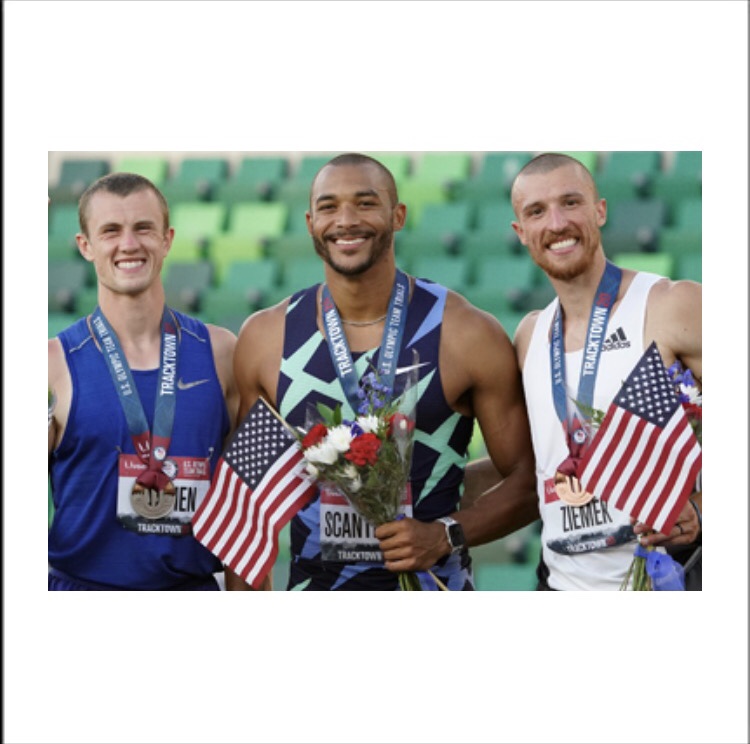Two decathlons of critical importance, taking place 5000 miles apart. Like a virtual Thorpe Cup, featuring two of the titans of combined events, Germany and USA. Two men on each team already with the Olympic qualifying standard, but with brutal selection processes to satisfy first. A suite of contenders waiting in the wings, seeking to bump the auto-qualifiers from the team. Two days and ten events. Sky high pole-vaulting. Storming 1500 metres. Lifetime bests shattered. Elation for five, devastation for others.
And in the heptathlon, a multi-nation story of two parts: part 1 in Germany, and part 2 at the US Olympic trials next weekend
HEPTATHLON
Canadian quarantine is no joke; even one of the greatest athletes of all time, Damian Warner, wasn’t immune to the need to self-isolate post-Götzis. However, his teammate Georgia Ellenwood decided to stay in Europe. She based herself in Austria for much of the period between Götzis at the end of May and transferred to Germany for her 3rd heptathlon of the year in Ratingen.
Ellenwood got off to a great start, with a PB of 13.40 in the hurdles in the second heat, while Odile Ahouanwanhou of Benin ran a PB of 13.25 in the first, and Finland’s Maria Huntington 13.16 in the third. After a 1.76 high jump, 12.29 shot and 24.29 200m, Ellenwood was positioned 7th overnight. The day 1 leader was Ahouanwanhou, followed by Huntington; a strong first day from the trio of Germans Sophie Weissenberg, Vanessa Grimm and Anna Maiwald in 3rd to 5th, and Verena Mayr in 6th. Mayr’s teammate Ivona Dadic withdrew after 3 events to protect a niggle in her knee.
Odile continued her strong performance into Day 2 with a duo of PBs in the long jump (6.07) and javelin (48.02). Georgia in turn jumped 6.20m and threw 48.57m, climbing to second.
With one event to go Ahouanwanhou was 153 points ahead of Ellenwood, with Huntington another 8 points behind, Grimm another 24 in 4th, and Mayr and Weissenberg a further 9 in joint 5th. In the end, both Weissenberg (after hurting her foot in the long jump) and Huntington withdrew before the 800m. However, that would have had no bearing on the overall result – Ellenwood unleashed an almighty 800m, as she did in Götzis, but this time her 2:12.59 took her past Ahouanwanhou and into first position, and a win in 6314, improving her PB by 90 points. Odile’s 6274 was another national record for Benin, and Vanessa Grimm continued her impressive form with 6231 in fourth behind Mayr in 6254.
“It was tough to stay motivated when I was training alone,” Georgia told Decathletes of Europe afterwards, “but it allowed me to focus in on what needed to be done. No distractions; just show up to training each day and try to improve. I think the hard part came when I wanted to celebrate after my win, and my family could only send their love from Canada. I’d do a lot for them to be with me in moments like that. Hopefully many more to come!”
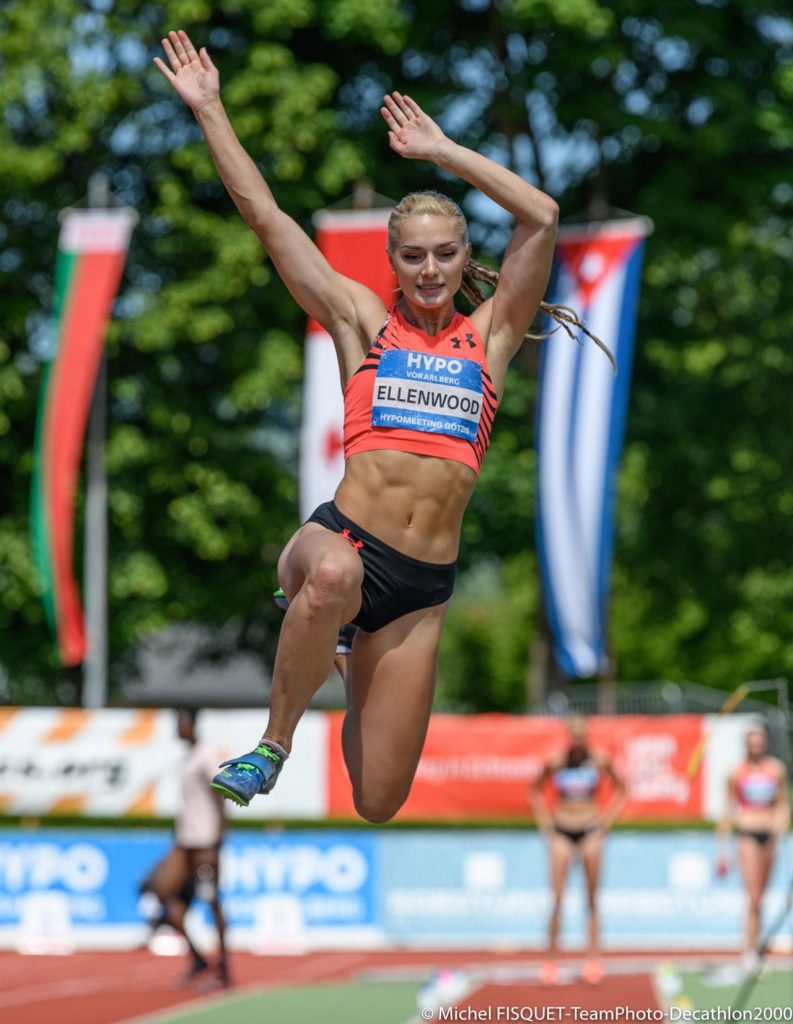
DECATHLON
100M
Unusually, the 100m in Germany was windier than the sprints in the USA. The 2020 German U23 champion Jannis Wolff, with newly bleached hair, kicked off the competition in Ratingen with a (windy +2.6) PB of 10.67 in the final heat, followed by Andreas Bechmann in 10.78 and Kai Kazmirek in 10.93. In addition to the trio of speedy Germans, in the earlier heats Oleksiy Kasyanov (UKR) also ran under 11 seconds with 10.97 and Poland’s Pawel Wiesiołek, in his 4th decathlon in just over a month, ran 10.83.
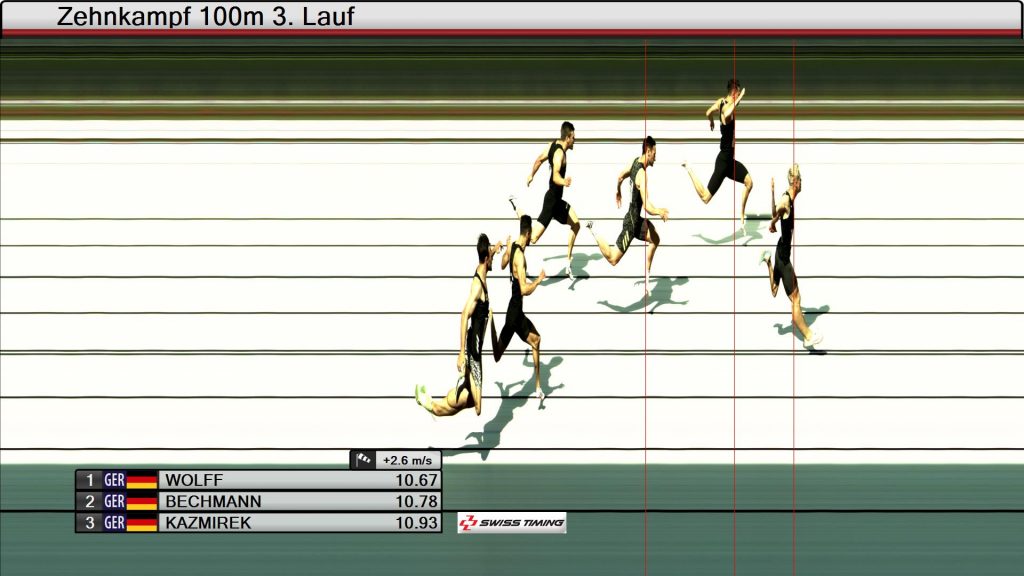
Several hours later, in the beautiful new reincarnation of Hayward Field, fourteen men ran under 11 seconds, headed by Steven Bastien in 10.52, Garrett Scantling in 10.53 and Devon Williams in 10.56, lifetime bests for all of them. Further down the field, 2019 Decastar runner-up Zach Ziemek put in a solid 10.70, and Kyle Garland ran a lifetime best in 10.79, the same time as Harrison Williams,
Harrison Williams and Garrett Scantling have had the auto-qualification since April, Scantling scoring 8476 at the Spec Towns Invitational in Athens, and Williams scoring 8439 in Chula Vista. Both have prior experience of the US trials – including Scantling’s agonising 4th place in 2016 which prompted him to go do other things (see my article for World Athletics about that below)– and so knew that nothing could be taken for granted with regards to qualification.
However, one would have forgiven the two German auto-qualifiers, Kazmirek and Niklas Kaul, for assuming a less demanding route to selection. Both already have 8350, and both have already met the 2021 German minimum for selection (8150) in Götzis, one of the three German qualifying competitions.
But with Bechmann, Matthias Brugger and Tim Nowak all coming into shape and capable of 8150, even 8350 at their best, and close to the qualification by rankings, the world champion and the 2017 world bronze medallist left nothing to chance and started the competition in Ratingen.
LONG JUMP, SHOT, HIGH JUMP
Onto the long jump and, in Germany, all progressed relatively smoothly. Kazmirek (7.38), Wiesiołek (7.35) and Bechmann (7.32) were the longest jumpers and Bechmann moved into the overall lead, where he would stay for the rest of Day 1. Niels Pittomvills jumped 7.29, continuing his form from his delightful return in Götzis a few weeks previously. Like Wiesiołek, who had had 3 no-throws in the discus in Tenerife, Jiři Sykora from the Czech Republic had quickly rerouted his plans from Arona to Ratingen to try and scramble another score to boost his rankings and wasn’t too far behind his marks from his first two events a week earlier.
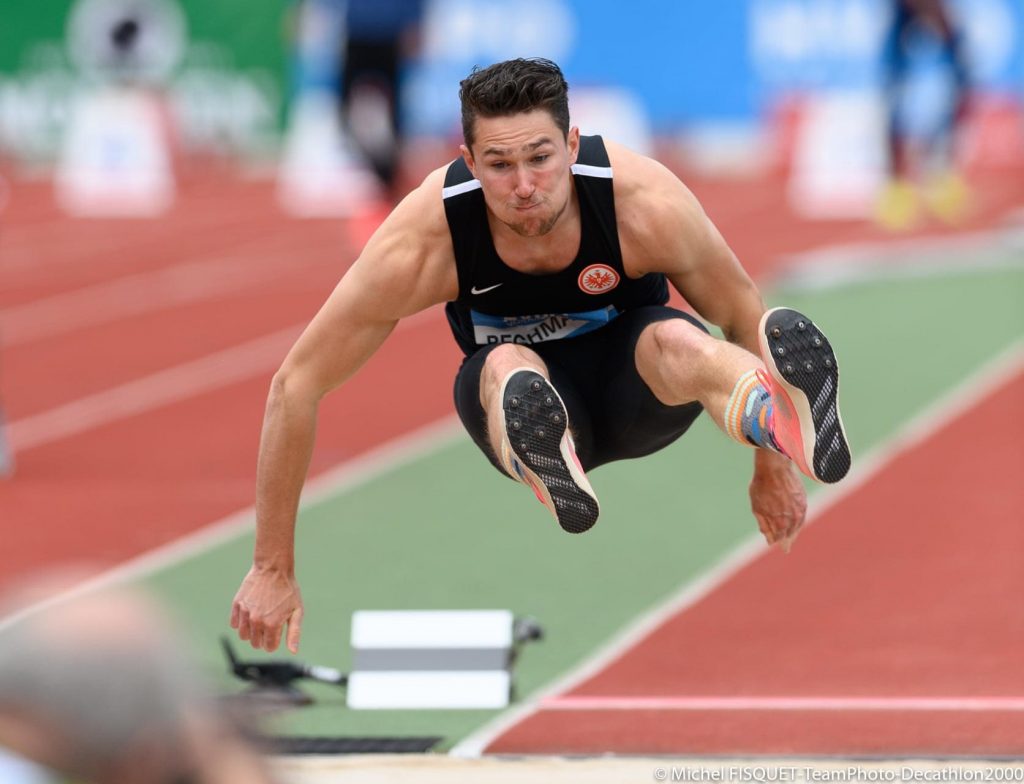
But in Eugene, we had some biiig jumps. Ziemek launched himself to 7.74, Kyle Garland another PB of 7.65 and Solomon Simmons – the third American in contention for Olympic selection due to rankings position – to a PB of 7.56. Scantling, with a jump of 7.61, moved ahead of Bastien into the lead and started to make himself comfortable in the top 3.
Garland continued his streak of improvements into the shot: an outdoor PB of 15.10, which he then improved in the second round with a massive throw of 15.79. Markus Ballengee threw a personal best of 15.26 and Jack Flood, who passed 8000 points for the first time earlier this year, set his first PB of the day with 14.29 in the third round. Although we did not know it at the time, Steven Bastien’s lifetime best of 14.47 would set the tone for what was to come.
After three events in Eugene, the top 5 were those you might expect: Scantling, Garland, Ziemek, Simmons and Harrison Williams; in Ratingen Bechmann (including a shot PB of 15.38), Kazmirek, Wiesiołek, Nowak (who threw over 15m for the first time) and Sykora.
The best high jumper in Ratingen was Nowak, skipping his way to an outdoor best of 2.06 and leaving Kazmirek, Bechmann and Basile Rolnin (FRA) behind at 2.03. Wolff and Luca Dieckmann set lifetime bests at 1.97, while Sykora no heighted. In Eugene, the high jumping went to another level. Kyle Garland cleared an astonishing 2.17, just short of his 2.18 best; Ziemek a lifetime best of 2.14, Flood and Bastien more lifetime bests at 2.11 and 2.08 respectively.
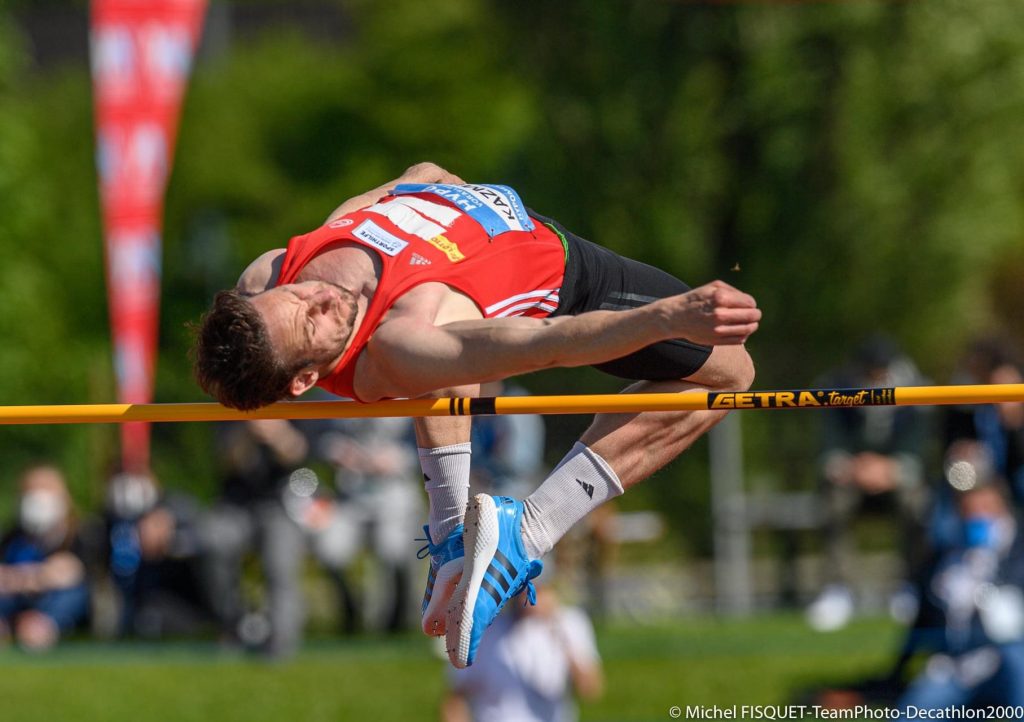
400m
Last event of day 1, and Pawel Wiesiołek, despite already having 7/10 of a decathlon from Arona in his legs, managed to squeeze out a lifetime best of 48.41 in the third heat. In the same race, Wolff also set his 3rd PB of the day, 49.35. Kai Kazmirek is the meeting record holder for this event – he ran 46.81 in 2019 – and this time ran the fastest time of the day 47.26, ahead of Bechmann who sliced 0.25 off his previous best to run 47.68. Brugger (48.62), Kaul (48.89) and Nowak (49.50) followed.
At the end of the first day Bechmann led with 4370 from Kazmirek (4304), followed by Nowak (4194), Wiesiołek (4152), Pittomvils (4076) and Brugger (4072). Kazmirek was clearly in the form that would take him into the lead in Day 2 and safely over the German standard, and Kaul was tiptoeing up the standing in his customary fashion – from 13th after the long jump to 12th after the shot, 10th after the high jump and 8th on Day 1. Nothing spectacular but, like Kazmirek, with 8150 in his reach.
Kaul had said he would pull out if it looked like no other athletes were on course to score 8350; if two of them were to do that in Ratingen, his Olympic selection could theoretically be in jeopardy. Bechmann was going well, but still recovering from Covid and his Götzis foot injury. Even if he matched his PBs on Day 2, he’d still be a little short of 8350. Brugger was in a similar position, 8350 a stretch without significant lifetime improvement. But the danger was Nowak – gathering momentum as the day went on and with the potential to reach both 8150 and what would be a lifetime best of 8350.
The 400 times in the US were similar – Bastien fastest in 47.79, followed by Samuel Black 48.05, Harrison Williams 48.21, Joe Delgado (more on him later) 48.48 and Tim Ehrhardt 48.62. Devon Williams did not start the 400m. Overnight, Scantling (4494) and Ziemek (4409) were clearly on for big scores with strong events to come, but could Harrison Williams hold onto the third spot?
HURDLES AND DISCUS
Day 2 in Ratingen, and the World Champion sprang into life. Kaul raced to a personal best of 14.38, behind the faster Brugger 14.28, and ahead of Kazmirek in 14.50 and Nowak in 14.69. Wolff set another PB of 14.70 and Bechmann was a little off his best at 15.24. Kaul climbed another 2 places to 6th, while Kazmirek took the overall lead in the competition, ahead of Bechmann, Nowak, Brugger and Pittomvils.
While Brugger was the fastest of the weekend in Ratingen, in the US only 3 men ran faster – and all of them started the day with slower lifetime bests than the German. Bastien ran 14.24 (a huge improvement from 14.52), Jack Flood in 14.08 (a hundredth under his lifetime best) and Garrett Scantling absolutely obliterated his previous best of 14.13 to run sub 14 and 13.88s.
Scantling started to stretch away overall, with Garland 150 points behind in 2nd, Bastien 3rd, Ziemek 4th and Harrison Williams 5th.
Scantling continued his dominance with the longest non-Ballengee throw in the discus. Both men set PBs, Scantling 48.17 to Ballengee’s 53.04. Further down the field, Scott Filip had a little consolation for his xxx with a discus PB of 41.15. Scantling was now 250 points ahead of Garland, but only 40 points separated Garland, Ziemek and Bastien, with Harrison another 75 points further back. The pole vault was going to be critical.
In Ratingen, Basile Rolnin threw the furthest with 50.25, ahead of Kasyanov in 47.71 (who would pull out shortly afterwards). While Kaul had the longest throw of the weekend among the top Germans, Bechmann set a PB of 42.33 to stay closer than he might have expected to Brugger (43.64) and Nowak (42.33). However, the threat to Kaul and Kazmirek was beginning to fade.
POLE VAULT, JAVELIN AND 1500 – RATINGEN
And so, to the drama. Kaul was untroubled in the pole vault, proceeding up to clear 4.90m without much ado. Bechmann, unusually, peaked at 4.80 and finished some 30cm short of his best; and Brugger’s highest vault was also 4.80. But one of the cruellest moments of the weekends happened at 4.70, when Tim Nowak’s pole splintered dramatically mid-vault, slicing his hand open and ending his competition, and his Olympic bid. No bones or tendons were injured, but it was a heart-breaking conclusion for Nowak nonetheless. Rolnin also no heighted.
Kaul retired from the pole vault, and the overall competition, at 5m, freeing up some valuable rankings points. Kazmirek went onto clear 5m and attempt 5.20, the two world medallists finished the event safely, with selection all but guaranteed.
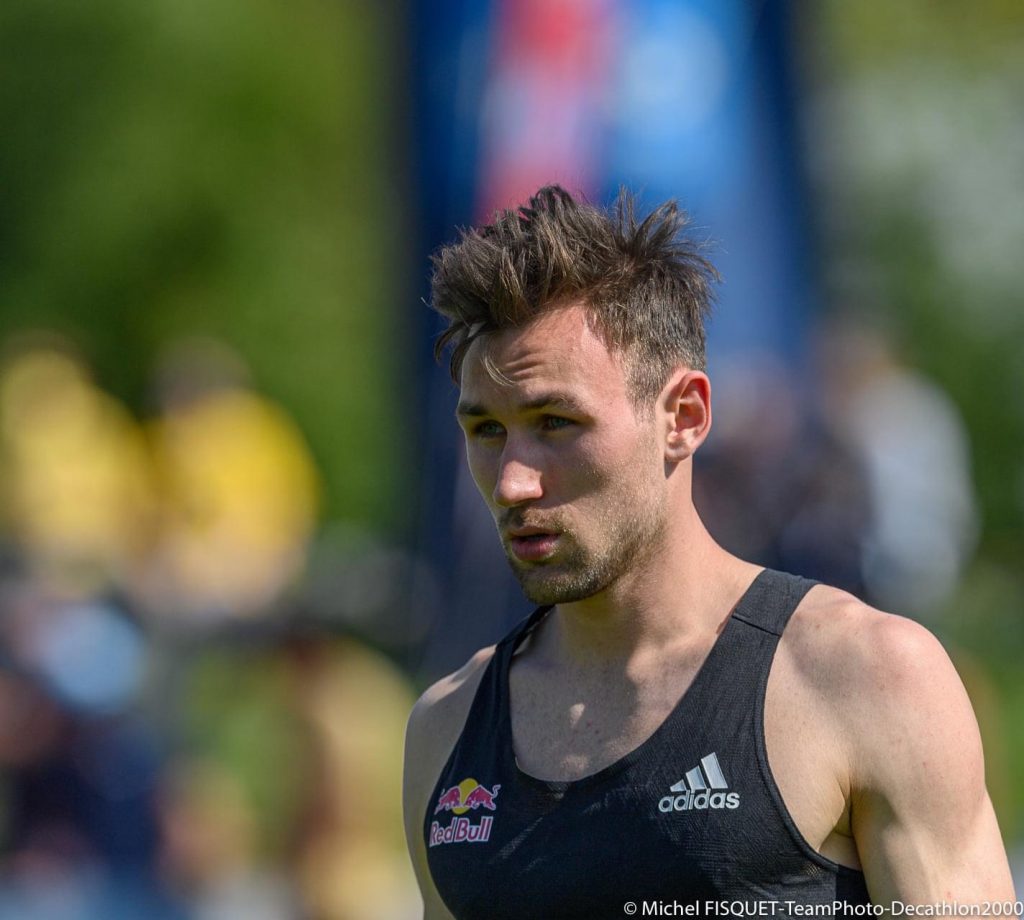
But that wasn’t the end of the action, as the 21-year-old German champion Malik Diakite picked up the baton where the big names left off. He cleared a modest, but important PB of 4.50 in the vault and then went on to throw a huge lifetime best in the javelin – 64.92, 6 metres ahead of anyone else in the competition. Sadly, during the javelin Niels Pittomvills also injured himself badly – the achilles injury which had been holding him back during the two days finally gave way.
With Kaul and Nowak out, we might have expected the 1500m to be a procession. But not for Mathias Brugger. Always among the fastest in the field – and playing his part as a rabbit for Damian Warner in his 9000-point attempt in Götzis a few weeks earlier – Brugger attacked the last event like a steam train, improving his lifetime best of 4:23.93 to 4:20.45. Brugger leapfrogged Bechmann for second place, scoring 8080 behind Kazmirek’s winning mark of 8184. Bechmann finished third in 7955 and teammate Wolff fourth in a big PB of 7831.
POLE VAULT, JAVELIN AND 1500 – EUGENE
Pole vault drama of a different kind emerged in Eugene. The athletes clocked through the heights rapidly, bringing their best game: Flood with an equal PB at 4.55, Bastien an equal PB at 4.95, Ballengee [first time over 5m] at 5.05 and Scantling at 5.15 (his best outdoors). Then the fun started. Williams cleared 5.25 but didn’t make it over 5.35. Ziemek and Ehrhardt cleared 5.35, ZZ with 3 attempts, Tim first time.
ZZ didn’t vault at 5.45, and you might have been forgiven for thinking he’d called it a day, since the javelin was about to start. Meanwhile Erhardt cleared 5.45 and set about 5.55. But he wasn’t alone. Ziemek had passed at 5.45 – his PB height – and came back at 5.55. Ehrhardt had 3 attempts at 5.55 but didn’t make it over. Ziemek? Over first time for a lifetime best.
For those watching outwith the US without a livestream, the little dash that popped up on the results at 5.65 suggested Ziemek had indeed finished the event. NOPE. ZZ passed 5.65 and return to attempt 5.75. He didn’t make it, but what an audacious return to competition he was having!
The athletes hurtled into the javelin, another suite of lifetime bests for some: Ballengee 54.78, Garland 56.19, Flood 58.51, and a 4m PB for Bastien at 61.20. Bastien and Williams had come into the competition with similar lifetime bests – 57.23 to 56.31, but the 128-point difference between Bastien’s 61.20 and Williams 52.69 put Bastien 110 points ahead of Harrison going into the final event.
Bastien was too far down the rankings to qualify through that route, so he needed the outright qualifying score of 8350, and he needed to finish ahead of Williams, who already had the score. Williams had a faster lifetime best in the 1500m, but only by 2 seconds: 4:27 to 4:29. One of these two men was going to have to run the 1500m of their life to qualify for the Olympics.
Meanwhile, Scantling was already on 8074 after 9 events – a score which would have placed him second in Ratingen and Arona, 12th in Götzis and in first place in Lana. He just needed to finish safely. Similarly, Ziemek was on 7795, needing a solid, if not spectacular final event to exceed 8350 points and finish in the top 3. Garland was too far behind to be able to reach 8350, although on for a good score.
So, it was between Williams, 14th in the 2019 World Championships and already with a qualifying score under his belt, and Bastien, who had never previously scored above 8050.
Joseph Delgado took on the pace, 65s at 400, 2:14 at 800. Williams tracked him, less than a second behind him for the first two laps. Bastien stuck to Williams like glue, just a breath or two behind for the first 800m. At 1200m, as Delgado started to stretch away, Bastien was holding Williams to a 1.5 second lead, which would have been enough to finish ahead of him. But Bastien also needed a big score. And so, emulating the storming run of Brugger in Ratingen, Bastien charged to 4:22.21, a 7 second personal best, taking 10 seconds out of Williams who ran well in 4:32. That took him to 8485, overtaking Ziemek for second place, and into his first Olympic team.
The final results were Scantling in 8647, Bastien 8485, Ziemek 8471 (all PBs) and Williams 8306.
But that wasn’t the end of the 8000-point marks. Delgado was fifth in a PB of 8161 his first 8000+, just a few points behind Kazmirek’s score in Ratingen (although of course Kazmirek can go much higher). Garland logged a respectable 8140, Markus Ballengee broke 8000 for the first time with 8097, Solomon Simmons logged 8037, and Jack Flood scored his second 8000-point decathlon with 8036 in 9th.
Arkansas Razorback Ballengee said afterwards “I felt pretty flat on Day 1, probably because of the multi I did at nationals. But Day 2, I got a second wind and was able to move up 7 spots and get a 202-point PR. If I can get Day 1 to where my Day 2 already is, I’ll be right there with the top guys. It feels good to finally put together a multi over 8000, almost 8100. But there’s so much more in the tank, so excited for what’s to come next.”
And so, Steven Bastien and Zach Ziemek become the 17th and 18th men to qualify automatically for the Olympics; seven places remain, since Williams will drop out of the list of auto Qs, as does Simmons from the rankings qualification places.
Pieter Braun, Vitaly Zhuk, Martin Roe, Jan Dolezal, Adam Sebastian Helcelet, Jorge Urena and Jiri Sykora hold those final seven places. Behind Sykora in the Road to Tokyo tool is Britain’s Tim Duckworth in 25th place who goes in the British Championships this weekend, and in 26th is Pawel Wiesiołek who has been announced for the Inter Europol meeting in Warsaw. Jorge Ureña also goes again at the Spanish championships this weekend, to try and climb out of danger.
Tim Nowak is 27th (and out of action), 28th is Basile Rolnin. This weekend is also the Estonian championships – Janek Õiglane is the highest place of all the Estonians (other than Uibo) in the rankings in 7th place, so if any of the 3 Estonian auto-qualifiers have to pull out for any reason, he is next in contention – and both Risto Lillemets and Kristjan Rosenberg are sitting in 28th with Rolnin.
The tension is rising…stay tuned for all that plus the US Olympic trials heptathlon.


